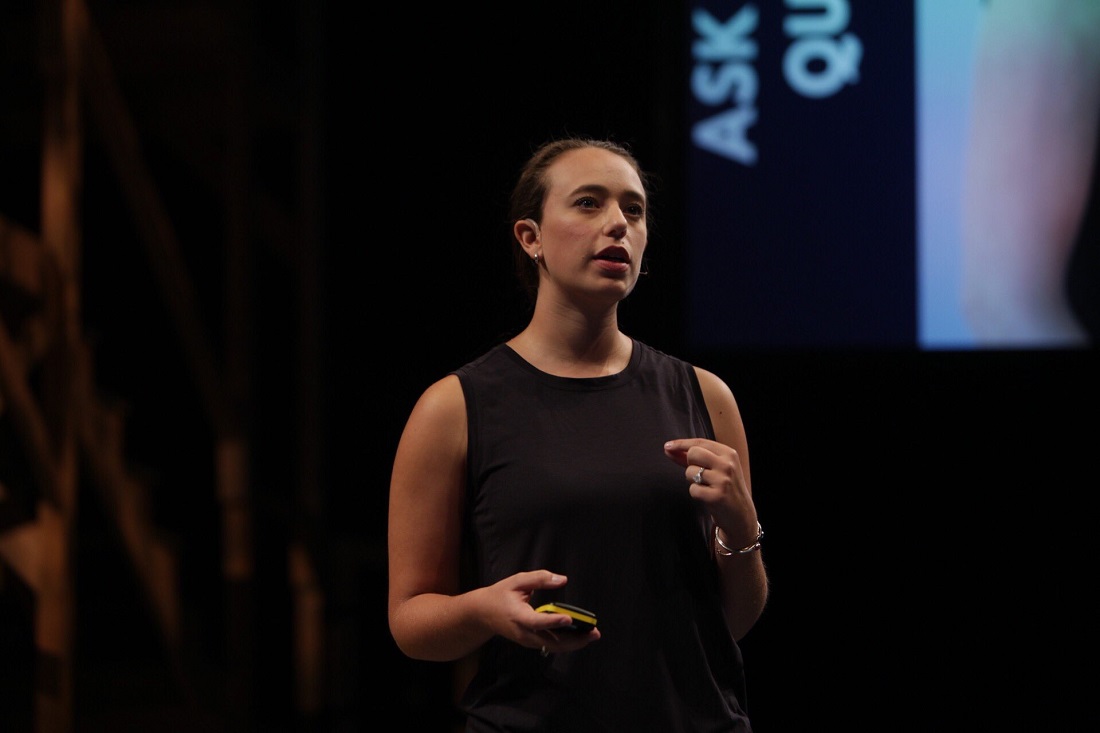I was diagnosed with Chronic Neurological Lyme Disease during my sophomore year of college. I needed a long-term IV PICC line that a lot of people get either for antibiotic use, chemotherapy, or nutritional support. I was just told to wear a cut sock on my arm, and I was like, “This is crazy!”
My dad, who is in the surfing industry, told me I should put a rashguard over it. So that’s how we got the idea to apply athletic fabric to the medical industry. That’s how Mighty Well started. It was an answer to my needs as a patient.
Growth Stage
We are entering a huge growth stage for Mighty Well right now. We’re about to have all our new products launch, build really great partnerships with health insurance companies, and I’ve been going all around the country speaking about understanding patient perspective, healthcare, and starting a business while in college.

Sometimes, I still can’t believe how much we have achieved in a short amount of time. People always ask me how I managed to start and grow a company while dealing with the difficulties of dealing with Lyme. My illness actually helped me found my purpose and fueled my entrepreneurial spirit.
Where It All Started
When I got a scholarship from Babson College for Women’s Entrepreneurial Leadership, I thought eventually I’d do something with entrepreneurship but I didn’t think it’d be so soon. My dad is a surfer and owned a surf shop for 25 years. And I grew up running around it, and I loved that if my dad ever wanted to do something, he could just take off from work since we had a few people working for it at the time.
That’s what initially got me interested in business, and then I studied it in high school and absolutely loved it. Once I started taking classes, I just thrived on it, and because of my medical situation, I had to become an entrepreneur early on in life.
Safe Place to Start
If you also have the entrepreneurial spirit, I highly recommend getting started in business through a class project and work on it during nights and weekends. I think that’s a fabulous way to start and dip your toes in the water.
College is such a safe place to experiment and try new things. Our school had a small seed fund where we got a few thousand dollars to test the idea, and students got school credit for helping me. I always tell young women to look at what your school has to offer and local accelerators in your area.
Show It Off
I recommend that it’s never too early to talk about your idea. Some people don’t want to talk about it and are worried someone might steal the idea, but an idea if just an idea unless you start to execute. Especially if it’s a consumer facing product, go show people your sketches, because chances are, people will be more interested than you think, and they’ll want to connect you to people who can potentially help. I think that’s one of the benefits we have as young female entrepreneurs is that people wanna help a lot more than we think.
Once you have the idea for the product, make sure to pick a name for your company that can grow with you. I wish I thought big from day one. Initially, we named our company and our product PICC Perfect. But as we got in the market, we realized that that name pigeonholed us and that’s why we decided to rebrand and call ourselves Mighty Well.
Finding Purpose
Though there are difficult days, I’m very grateful that I have found my purpose in Mighty Well and helping other patients turn their sickness into strength. Yes, it is very challenging to pursue big dreams while managing your illness at the same time. But it is not impossible. In fact, it can even give you strength to start and to keep going.
I want to share other amazing members of our community who have found their purpose as well despite the challenges of chronic illness.
When you have an invisible illness, one that is unrecognized by a large majority of the medical community, it can be hard to even believe yourself. My experience has strengthened me in such a profound way, something I’ve found difficult to describe.
This disease isn’t one that’s easily fought. I’ve had doctors tell me I’m crazy, days where I can’t get off the bathroom floor, and moments in which giving up has sounded better than continuing to fight. Through these experiences, I’ve learned a new sense of patience, with myself and with my body. I now understand that time isn’t a factor with chronic illness. It’s evident that my fight with Lyme is ongoing, and through this realization, I’ve become increasingly understanding of the process. I am so damn (can I say that?) strong and I try to remind myself that every day.
Hannah Olsen
My diagnosis has definitely made me stronger as a person and I am constantly pushing myself. I refuse to let my disease define me or hold me back from accomplishing anything.
Living a normal life was a thing of the past, so the only thing I could do was embrace my diagnosis and live life to the fullest. Since my diagnosis I have ran two 1/2 marathons, a full marathon, road in several 50 mile bike races, competed in triathlons, road 180+ miles for cancer research.
Would I have accomplished as much if I was never diagnosed with Type 1? Probably not.Along with pushing myself to new physical limits, I also wanted to challenge myself in other ways and become the best version of myself because the reality is, any day (any low blood sugar) could be my last.
Erika Young
I grew up living with multiple tick-borne infections, but I was really ashamed to talk about my experience living with chronic illness as a kid and a teenager. I was scared people wouldn’t understand what I was going through, or worse – that they wouldn’t believe me. It wasn’t until I started writing about my experience with Lyme and TBD when I was in high school that I realized that so many people had similar experiences to me.
Ultimately, I found purpose through writing about my own experience and the experiences of others in my book, Suffering the Silence: Chronic Lyme disease in an Age of Denial. The book then led to starting a nonprofit and so much other work in the illness community. Now that I am healthier, I’m able to use my energy and my focus to help other people tell their illness stories. I feel like I found my purpose through this journey, and I’m so grateful to that.
Allie Cashel
Want to connect with me and other Friends in the Fight? Join us in our Friends in the Fight Facebook group.

